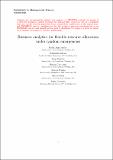Business Analytics for Flexible Resource Allocation Under Random Emergencies
Author(s)
Angalakudati, Mallik; Balwani, Siddharth; Calzada, Jorge; Chatterjee, Bikram; Perakis, Georgia; Raad, Nicolas; Uichanco, Joline; ... Show more Show less
DownloadPerakis_Business analytics.pdf (315.4Kb)
OPEN_ACCESS_POLICY
Open Access Policy
Creative Commons Attribution-Noncommercial-Share Alike
Terms of use
Metadata
Show full item recordAbstract
In this paper, we describe both applied and analytical work in collaboration with a large multistate gas utility. The project addressed a major operational resource allocation challenge that is typical to the industry. We study the resource allocation problem in which some of the tasks are scheduled and known in advance, and some are unpredictable and have to be addressed as they appear. The utility has maintenance crews that perform both standard jobs (each must be done before a specified deadline) as well as respond to emergency gas leaks (that occur randomly throughout the day and could disrupt the schedule and lead to significant overtime). The goal is to perform all the standard jobs by their respective deadlines, to address all emergency jobs in a timely manner, and to minimize maintenance crew overtime. We employ a novel decomposition approach that solves the problem in two phases. The first is a job scheduling phase, where standard jobs are scheduled over a time horizon. The second is a crew assignment phase, which solves a stochastic mixed integer program to assign jobs to maintenance crews under a stochastic number of future emergencies. For the first phase, we propose a heuristic based on the rounding of a linear programming relaxation formulation and prove an analytical worst-case performance guarantee. For the second phase, we propose an algorithm for assigning crews that is motivated by the structure of an optimal solution. We used our models and heuristics to develop a decision support tool that is being piloted in one of the utility's sites. Using the utility's data, we project that the tool will result in a 55% reduction in overtime hours.
Date issued
2014-04Department
Sloan School of ManagementJournal
Management Science
Publisher
Institute for Operations Research and the Management Sciences (INFORMS)
Citation
Angalakudati, Mallik, Siddharth Balwani, Jorge Calzada, Bikram Chatterjee, Georgia Perakis, Nicolas Raad, and Joline Uichanco. “Business Analytics for Flexible Resource Allocation Under Random Emergencies.” Management Science 60, no. 6 (June 2014): 1552–73.
Version: Author's final manuscript
ISSN
0025-1909
1526-5501